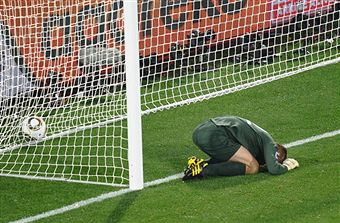By Tom Degun
June 17 – England goalkeeper Rob Green, the man responsible for the catastrophic mistake which led to United States’ equalising against England in the World Cup last Saturday (June 12), will be able overcome the error if he takes the right steps according to the Head of Performance Psychology at the English Institute of Sport (EIS) Mark Bawden.
Green has come under huge criticism from both the media and England supporters for his error with an increasing number of reports suggesting he should be dropped from the side.
But Bawden claimed the West Ham United goalkeeper could potentially recover from the blunder to have a fantastic tournament.
Bawden said: “The issue for athletes is whether they deal with an experience emotionally or logically.
“Athletes need to engage in the logical and remove themselves from the emotional so that there’s not a long term impact.
“A mistake doesn’t make you a bad player overnight.”
At the World Cup, however, Bawden says the scrutiny of the media and fans means that players are faced with increased judgement and they need to confront their performances head on.
He said: “Getting things out in the open and addressing a poor performance or mistake can help to rationalise it.
“The key is to avoid ‘catastrophising’ the event and turning it into a major anxiety.
“Athletes need to focus on their strengths to move forward rather than code the experience as fearful.
“All it takes is a positive experience to supersede a negative one and avoid dwelling on things.”
Bawden also revealed that taking a unified team approach to coping with the pressure of major events can be a key factor in overcoming obstacles and going on to succeed.
He said: “It’s important that teams establish internal rules of expectations, so that athletes, coaches and support staff know what is expected from each other and avoid letting external judgements affect their performance.
“At major events like the World Cup, there can often be higher expectations from athletes and those around them and in turn they feel a higher sense of consequence.
“This is why we often see teams play within themselves at the start of the tournament.
“However, we want athletes to avoid playing with a fear of failure, which can happen if they allow judgements to be the focus of their performance.
“Once there is a mistake from the team, it can help clear the air and allow them to focus on their strengths and to play how they do usually and move forward.”
Contact the writer of this story at zib.l1745313588labto1745313588ofdlr1745313588owedi1745313588sni@n1745313588uged.1745313588mot1745313588
Related stories
June 2010: Mike Rowbottom – Cautious optimism is the English way

